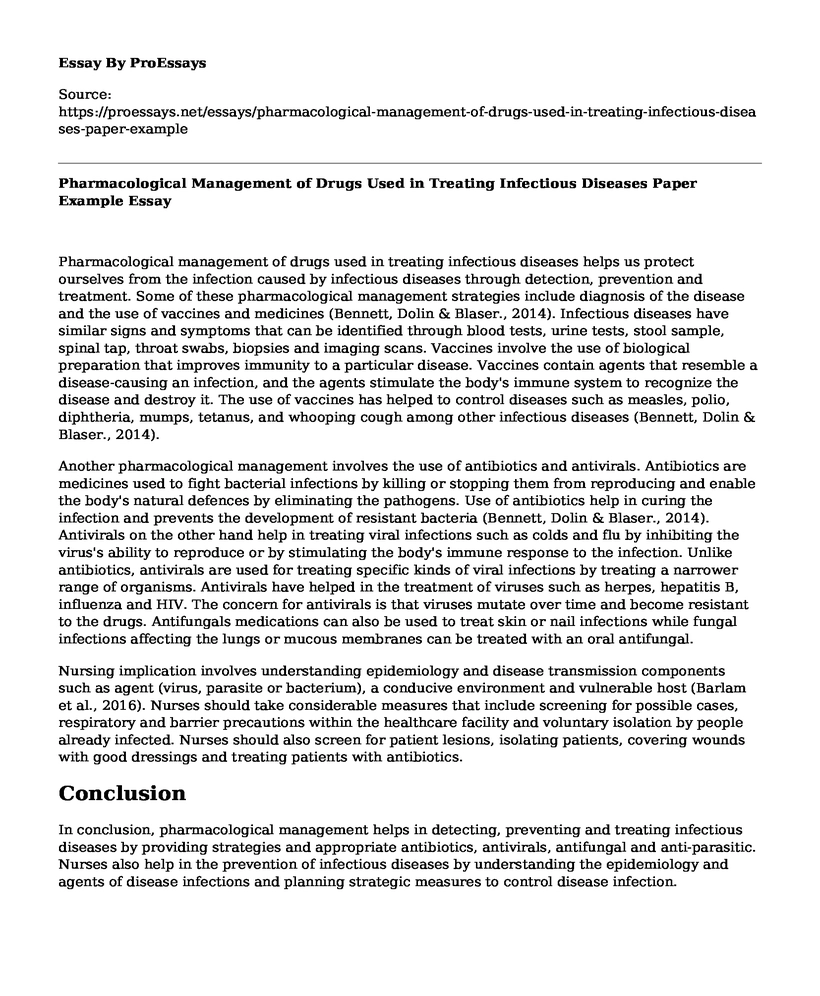Pharmacological management of drugs used in treating infectious diseases helps us protect ourselves from the infection caused by infectious diseases through detection, prevention and treatment. Some of these pharmacological management strategies include diagnosis of the disease and the use of vaccines and medicines (Bennett, Dolin & Blaser., 2014). Infectious diseases have similar signs and symptoms that can be identified through blood tests, urine tests, stool sample, spinal tap, throat swabs, biopsies and imaging scans. Vaccines involve the use of biological preparation that improves immunity to a particular disease. Vaccines contain agents that resemble a disease-causing an infection, and the agents stimulate the body's immune system to recognize the disease and destroy it. The use of vaccines has helped to control diseases such as measles, polio, diphtheria, mumps, tetanus, and whooping cough among other infectious diseases (Bennett, Dolin & Blaser., 2014).
Another pharmacological management involves the use of antibiotics and antivirals. Antibiotics are medicines used to fight bacterial infections by killing or stopping them from reproducing and enable the body's natural defences by eliminating the pathogens. Use of antibiotics help in curing the infection and prevents the development of resistant bacteria (Bennett, Dolin & Blaser., 2014). Antivirals on the other hand help in treating viral infections such as colds and flu by inhibiting the virus's ability to reproduce or by stimulating the body's immune response to the infection. Unlike antibiotics, antivirals are used for treating specific kinds of viral infections by treating a narrower range of organisms. Antivirals have helped in the treatment of viruses such as herpes, hepatitis B, influenza and HIV. The concern for antivirals is that viruses mutate over time and become resistant to the drugs. Antifungals medications can also be used to treat skin or nail infections while fungal infections affecting the lungs or mucous membranes can be treated with an oral antifungal.
Nursing implication involves understanding epidemiology and disease transmission components such as agent (virus, parasite or bacterium), a conducive environment and vulnerable host (Barlam et al., 2016). Nurses should take considerable measures that include screening for possible cases, respiratory and barrier precautions within the healthcare facility and voluntary isolation by people already infected. Nurses should also screen for patient lesions, isolating patients, covering wounds with good dressings and treating patients with antibiotics.
Conclusion
In conclusion, pharmacological management helps in detecting, preventing and treating infectious diseases by providing strategies and appropriate antibiotics, antivirals, antifungal and anti-parasitic. Nurses also help in the prevention of infectious diseases by understanding the epidemiology and agents of disease infections and planning strategic measures to control disease infection.
References
Barlam, T. F., Cosgrove, S. E., Abbo, L. M., MacDougall, C., Schuetz, A. N., Septimus, E. J., ... & Hamilton, C. W. (2016). Implementing an antibiotic stewardship program: guidelines by the Infectious Diseases Society of America and the Society for Healthcare Epidemiology of America. Clinical Infectious Diseases, 62(10), e51-e77.
Bennett, J. E., Dolin, R., & Blaser, M. J. (2014). Principles and practice of infectious diseases (Vol. 1). Elsevier Health Sciences.
Cite this page
Pharmacological Management of Drugs Used in Treating Infectious Diseases Paper Example. (2022, Nov 20). Retrieved from https://proessays.net/essays/pharmacological-management-of-drugs-used-in-treating-infectious-diseases-paper-example
If you are the original author of this essay and no longer wish to have it published on the ProEssays website, please click below to request its removal:
- Paper Sample: Complexities and Risks that Face Multinational Corporations
- Paper Example on Technology in Healthcare Provision
- The Issue of Power in Nursing Leadership Essay
- Terrorist's Impact on Emergency Management Planning
- Improving Patient Intake Process: Analysis of Theory of Constraints, Murphey's Law and Parkinson's Law
- Paper Example on GERD: Symptoms, Causes, and Treatment
- Essay Sample on Old Age: Prolonging Life with Technology







